1997 TOYOTA TACOMA tow
[x] Cancel search: towPage 133 of 221
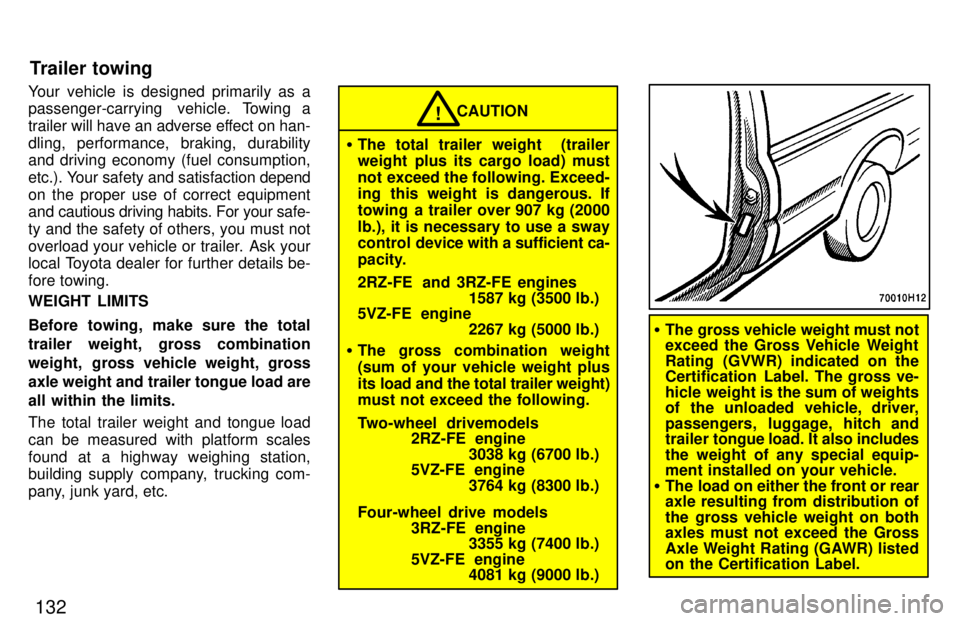
132
Your vehicle is designed primarily as a
passenger-carrying vehicle. Towing a
trailer will have an adverse effect on han-
dling, performance, braking, durability
and driving economy (fuel consumption,
etc.). Your safety and satisfaction
depend
on the proper use of correct equipment
and cautious driving habits. For your safe-
ty and the safety of others, you must not
overload your vehicle or trailer. Ask your
local Toyota dealer for further details be- fore towing. WEIGHT LIMITS
Before towing, make sure the total
trailer weight, gross combination
weight, gross vehicle weight, grossaxle weight and trailer tongue load are
all within the limits.
The total trailer weight and tongue load
can be measured with platform scales
found at a highway weighing station,
building supply company, trucking com-
pany, junk yard, etc.
CAUTION
� The total trailer weight (trailer
weight plus its cargo load) must
not exceed the following. Exceed-
ing this weight is dangerous. If
towing a trailer over 907 kg (2000lb.), it is necessary to use a sway
control device with a sufficient ca-
pacity.
2RZ-FE and 3RZ-FE engines 1587 kg (3500 lb.)
5VZ-FE engine
2267 kg (5000 lb.)
� The gross combination weight
(sum of your vehicle weight plus
its load and the total trailer weight)
must not exceed the following.
Two-wheel drivemodels
2RZ-FE engine
3038 kg (6700 lb.)
5VZ-FE engine
3764 kg (8300 lb.)
Four-wheel drive models 3RZ-FE engine 3355 kg (7400 lb.)
5VZ-FE engine 4081 kg (9000 lb.)!
�The gross vehicle weight must not
exceed the Gross Vehicle Weight
Rating (GVWR) indicated on the
Certification Label. The gross ve-
hicle weight is the sum of weights
of the unloaded vehicle, driver,
passengers, luggage, hitch and
trailer tongue load. It also includes
the weight of any special equip-
ment installed on your vehicle.
� The load on either the front or rearaxle resulting from distribution of
the gross vehicle weight on both axles must not exceed the Gross
Axle Weight Rating (GAWR) listed on the Certification Label.
Trailer towing
Page 134 of 221
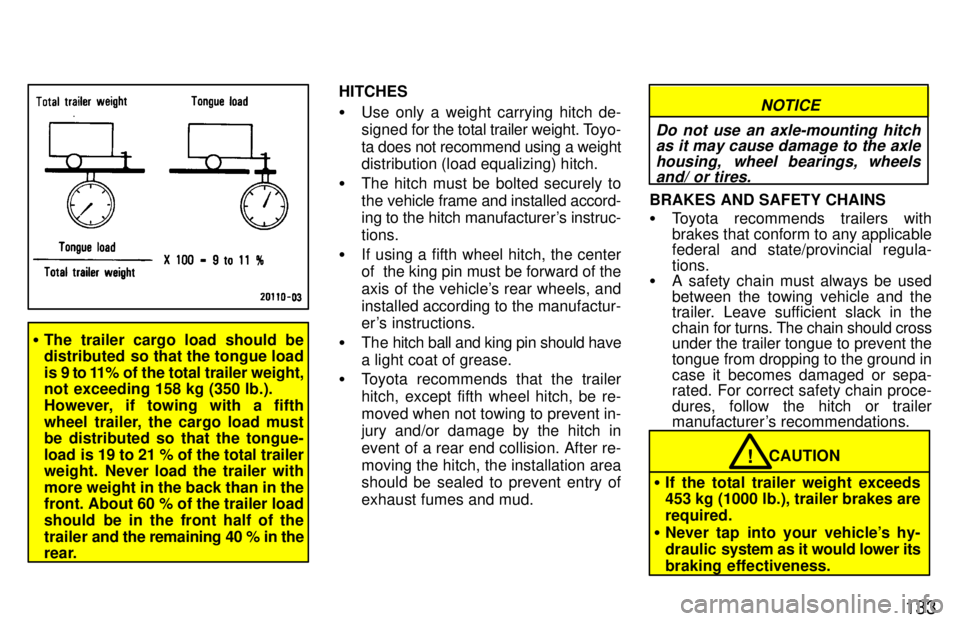
133
�The trailer cargo load should be
distributed so that the tongue load
is 9 to 11% of the total trailer weight,
not exceeding 158 kg (350 lb.).
However, if towing with a fifth
wheel trailer, the cargo load must be distributed so that the tongue-
load is 19 to 21 % of the total trailer
weight. Never load the trailer with
more weight in the back than in the front. About 60 % of the trailer load
should be in the front half of the
trailer and the remaining 40 % in the
rear. HITCHES �
Use only a weight carrying hitch de-
signed for the total trailer weight. Toyo-
ta does not recommend using a weight
distribution (load equalizing) hitch.
� The hitch must be bolted securely to
the vehicle frame and installed accord-
ing to the hitch manufacturer's instruc- tions.
� If using a fifth wheel hitch, the center
of the king pin must be forward of the
axis of the vehicle's rear wheels, and
installed according to the manufactur-
er's instructions.
� The hitch ball and king pin should have a light coat of grease.
� Toyota recommends that the trailer
hitch, except fifth wheel hitch, be re-moved when not towing to prevent in- jury and/or damage by the hitch in
event of a rear end collision. After re-moving the hitch, the installation area
should be sealed to prevent entry of exhaust fumes and mud.
Do not use an axle-mounting hitch
as it may cause damage to the axle
housing, wheel bearings, wheelsand/ or tires.
NOTICE
BRAKES AND SAFETY CHAINS � Toyota recommends trailers with brakes that conform to any applicable
federal and state/provincial regula- tions.
� A safety chain must always be used
between the towing vehicle and the
trailer. Leave sufficient slack in the
chain for turns. The chain should cross
under the trailer tongue to prevent thetongue from dropping to the ground in
case it becomes damaged or sepa-
rated. For correct safety chain proce-
dures, follow the hitch or trailer
manufacturer 's recommendations.
CAUTION
� If the total trailer weight exceeds
453 kg (1000 lb.), trailer brakes are required.
� Never tap into your vehicle's hy-
draulic system as it would lower its
braking effectiveness.!
Page 135 of 221
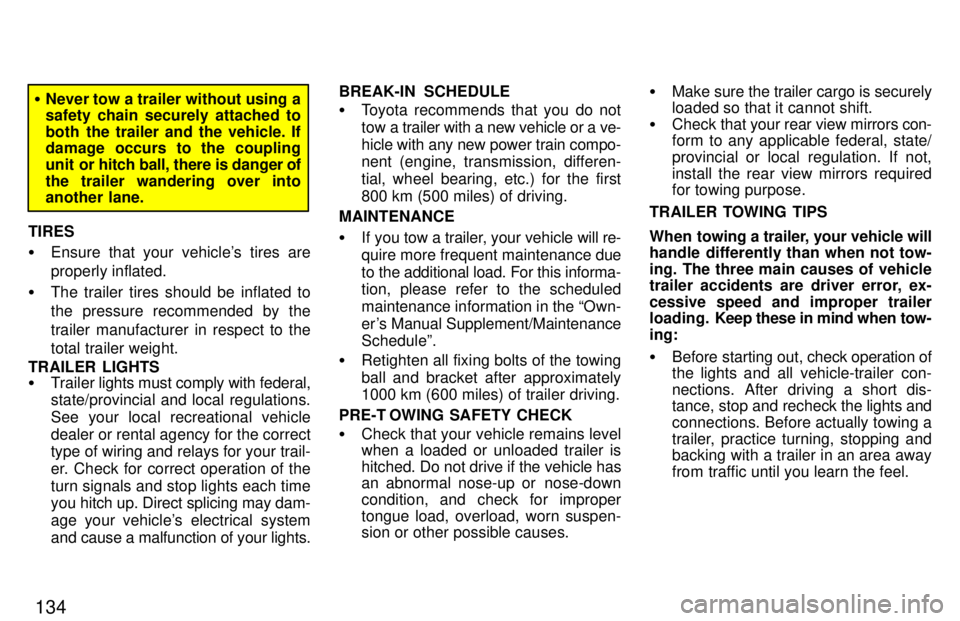
134
�Never tow a trailer without using a
safety chain securely attached to
both the trailer and the vehicle. If
damage occurs to the coupling
unit or hitch ball, there is danger of
the trailer wandering over into
another lane.
TIRES � Ensure that your vehicle's tires are
properly inflated.
� The trailer tires should be inflated to
the pressure recommended by the
trailer manufacturer in respect to the
total trailer weight.
TRAILER LIGHTS � Trailer lights must comply with federal,
state/provincial and local regulations. See your local recreational vehicle
dealer or rental agency for the correct type of wiring and relays for your trail-
er. Check for correct operation of the
turn signals and stop lights each time
you hitch up. Direct splicing may dam-
age your vehicle's electrical system
and cause a malfunction of your lights. BREAK-IN SCHEDULE �
Toyota recommends that you do not
tow a trailer with a new vehicle or a ve-
hicle with any new power train compo-
nent (engine, transmission, differen- tial, wheel bearing, etc.) for the first
800 km (500 miles) of driving.
MAINTENANCE � If you tow a trailer, your vehicle will re-
quire more frequent maintenance due
to the additional load. For this informa-
tion, please refer to the scheduled
maintenance information in the Own-
er 's Manual Supplement/Maintenance Scheduleº.
� Retighten all fixing bolts of the towing
ball and bracket after approximately
1000 km (600 miles) of trailer driving.
PRE-T OWING SAFETY CHECK � Check that your vehicle remains level
when a loaded or unloaded trailer is
hitched. Do not drive if the vehicle has
an abnormal nose-up or nose-down
condition, and check for improper
tongue load, overload, worn suspen-
sion or other possible causes. �
Make sure the trailer cargo is securely
loaded so that it cannot shift.
� Check that your rear view mirrors con-
form to any applicable federal, state/
provincial or local regulation. If not,
install the rear view mirrors required
for towing purpose.
TRAILER TOWING TIPS
When towing a trailer, your vehicle will
handle differently than when not tow- ing. The three main causes of vehicle
trailer accidents are driver error, ex-
cessive speed and improper trailer
loading. Keep these in mind when tow-
ing: � Before starting out, check operation of
the lights and all vehicle-trailer con-
nections. After driving a short dis-
tance, stop and recheck the lights and
connections. Before actually towing a
trailer, practice turning, stopping and
backing with a trailer in an area away
from traffic until you learn the feel.
Page 136 of 221

135
�
Backing w ith a trailer is difficult and re-
quires practice. Grip the bottom of the steering wheel and move your hand to
the left to move the trailer to the left. Move your hand to the right to move
the trailer to the right. (This procedureis generally opposite to that when
backing without a trailer). Also, just
turn the steering wheel a little at a time,
avoiding sharp or prolonged turning. Have someone guide you when back-
ing to reduce the risk of an accident.
� Because stopping distance may be in-
creased, vehicle-to-vehicle distance
should be increased when towing a
trailer. For each 16 km/h (10 mph) of speed, allow at least one vehicle and
trailer length between you and the ve-
hicle ahead. Avoid sudden braking as you may skid, resulting in jackknifing and loss of control This is especially
true on wet or slippery surfaces.
� Avoid jerky starts or sudden accelera-tion. If your vehicle has manual trans-
mission, prevent excessive clutch slip-
page by keeping engine rpm low and
not racing the engine. Always start out
in first gear. �
Avoid jerky steering and sharp turns.
The trailer could hit your vehicle in a
tight turn. Slow down before making a
turn to avoid the necessity of sudden braking.
� Remember that when making a turn,the trailer wheels will be closer than the vehicle wheels to the inside of the
turn. Therefore, compensate for this
by making a larger than normal turning
radius with your vehicle.
� Crosswinds and rough roads will ad-
versely affect handling of your vehicle
and trailer, causing sway. Pay atten-
tion to the rear from time to time to pre-
pare yourself for being passed by largetrucks or buses, which may cause your
vehicle and trailer to sway. If swaying
happens, firmly grip the steering wheel
and reduce speed immediately but
gradually. Never increase speed.
Steer straight ahead. If you make no
extreme correction with the steering or
brakes, the vehicle and trailer will sta-bilize.
� Be careful when passing other ve-hicles. Passing requires considerable
distance. After passing a vehicle, do
not forget the length of your trailer and
be sure you have plenty of room be-
fore changing lanes. �
In order to maintain engine braking ef-
ficiency, do not use fifth gear (manual
transmission) or overdrive (automatic transmission).
� Because of the added load of the trail-
er, your vehicle's engine may overheat
on hot days (at temperatures over 30 5C [85 5F]) when going up a long or
steep grade with a trailer. If the engine
coolant temperature gauge indicates
overheating, immediately turn off the
air conditioning (if in use), pull off the
road and stop in a safe spot. Refer to
If your vehicle overheatsº in Part 4 of this manual.
� Always place wheel blocks under both
the vehicle and trailer wheels whenparking. Apply the parking brake firm-
ly. Put the transmission in Pº (auto-
matic) or in first or reverse (manual).
Avoid parking on a slope with a trailer, but if it cannot be avoided, do so onlyafter performing the following:
1. Apply the brakes and hold.
2. Have someone place wheel blocks un-
der both the vehicle and trailer wheels.
3. When the wheel blocks are in place, release your brakes slowly until the blocks absorb the load.
Page 137 of 221
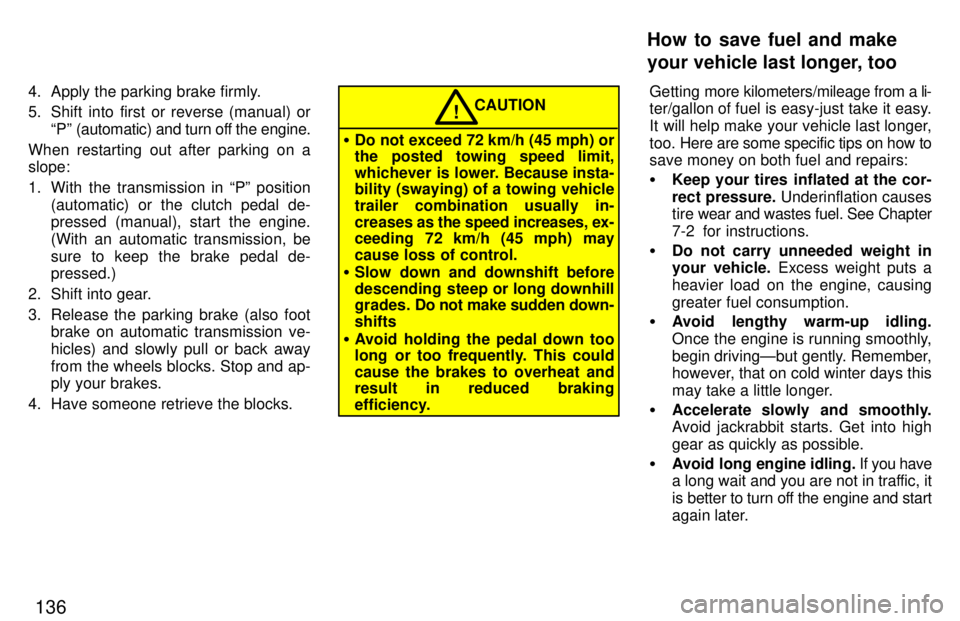
136
4. Apply the parking brake firmly.
5. Shift into first or reverse (manual) or
Pº (automatic) and turn off the engine.
When restarting out after parking on a slope:
1. With the transmission in Pº position (automatic) or the clutch pedal de-
pressed (manual), start the engine.
(With an automatic transmission, be
sure to keep the brake pedal de- pressed.)
2. Shift into gear.
3. Release the parking brake (also foot brake on automatic transmission ve- hicles) and slowly pull or back away
from the wheels blocks. Stop and ap- ply your brakes.
4. Have someone retrieve the blocks.
� Do not exceed 72 km/h (45 mph) or
the posted towing speed limit,
whichever is lower. Because insta- bility (swaying) of a towing vehicle
trailer combination usually in-
creases as the speed increases, ex-
ceeding 72 km/h (45 mph) maycause loss of control.
� Slow down and downshift before
descending steep or long downhill
grades. Do not make sudden down-
shifts
� Avoid holding the pedal down too
long or too frequently. This could
cause the brakes to overheat and
result in reduced braking
efficiency.
CAUTION! Getting
more kilometers/mileage from a li-
ter/gallon of fuel is easy-just take it easy.
It will help make your vehicle last longer,
too. Here are some specific tips on how to
save money on both fuel and repairs: � Keep your tires inflated at the cor- rect pressure. Underinflation causes
tire wear and wastes fuel. See Chapter
7-2 for instructions.
� Do not carry unneeded weight in
your vehicle. Excess weight puts a
heavier load on the engine, causing greater fuel consumption.
� Avoid lengthy warm-up idling.
Once the engine is running smoothly,
begin drivingÐbut gently. Remember,
however, that on cold winter days this
may take a little longer.
� Accelerate slowly and smoothly.
Avoid jackrabbit starts. Get into high
gear as quickly as possible.
� Avoid long engine idling. If you have
a long wait and you are not in traffic, it
is better to turn off the engine and start
again later.
How to save fuel and make
your vehicle last longer, too
Page 140 of 221
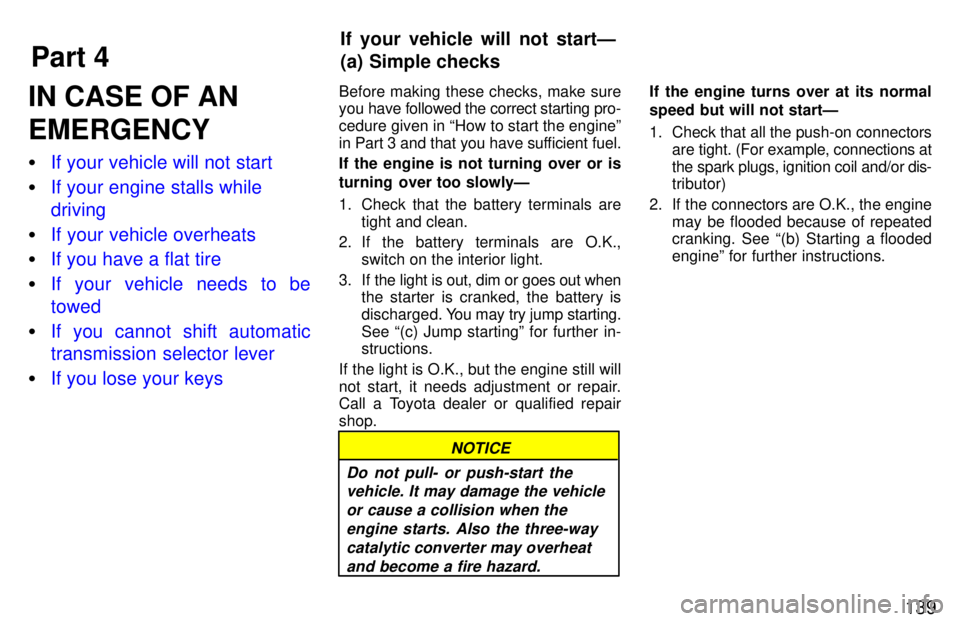
Part 4If your vehicle will not startÐ
(a) Simple checks
139
IN CASE OF AN EMERGENCY �
If your vehicle will not start
�If your engine stalls while driving
�If your vehicle overheats
�If you have a flat tire
�If your vehicle needs to be towed
�If you cannot shift automatic
transmission selector lever
�If you lose your keys
Before making these checks, make sure
you have followed the correct starting pro-
cedure given in How to start the engineº
in Part 3 and that you have sufficient fuel.
If the engine is not turning over or is
turning over too slowlyÐ
1. Check that the battery terminals are
tight and clean.
2. If the battery terminals are O.K., switch on the interior light.
3. If the light is out, dim or goes out when the starter is cranked, the battery is
discharged. You may try jump starting.
See (c) Jump startingº for further in- structions.
If the light is O.K., but the engine still will
not start, it needs adjustment or repair.
Call a Toyota dealer or qualified repair shop.
NOTICE
Do not pull- or push-start the vehicle. It may damage the vehicle
or cause a collision when theengine starts. Also the three-way catalytic converter may overheatand become a fire hazard.
If the engine turns over at its normal
speed but will not startÐ
1. Check that all the push-on connectors are tight. (For example, connections at the spark plugs, ignition coil and/or dis-
tributor)
2. If the connectors are O.K., the engine may be flooded because of repeated
cranking. See (b) Starting a flooded
engineº for further instructions.
Page 141 of 221
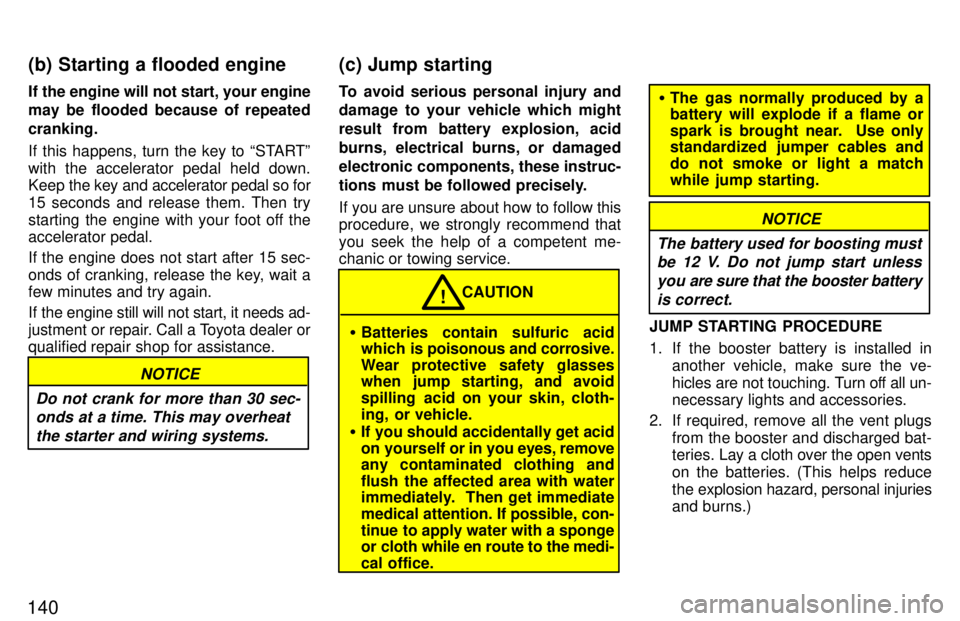
140If the engine will not start, your engine
may be flooded because of repeated cranking.
If this happens, turn the key to STARTº with the accelerator pedal held down.
Keep
the key and accelerator pedal so for
15 seconds and release them. Then try
starting the engine with your foot off the accelerator pedal.
If the engine does not start after 15 sec-
onds of cranking, release the key, wait a few minutes and try again.
If the engine still will not start, it needs ad-
justment or repair. Call a Toyota dealer or
qualified repair shop for assistance.
NOTICE
Do not crank for more than 30 sec- onds at a time. This may overheat
the starter and wiring systems.
To avoid serious personal injury and
damage to your vehicle which might
result from battery explosion, acid
burns, electrical burns, or damaged
electronic components, these instruc-
tions must be followed precisely.
If you are unsure about how to follow this procedure, we strongly recommend that you seek the help of a competent me-
chanic or towing service.
� Batteries contain sulfuric acid
which is poisonous and corrosive.
Wear protective safety glasses
when jump starting, and avoid
spilling acid on your skin, cloth-
ing, or vehicle.
� If you should accidentally get acid
on yourself or in you eyes, remove
any contaminated clothing and
flush the affected area with water
immediately. Then get immediate
medical attention. If possible, con-
tinue to apply water with a sponge
or cloth while en route to the medi- cal office. CAUTION
!
�
The gas normally produced by a battery will explode if a flame or
spark is brought near. Use only
standardized jumper cables and
do not smoke or light a match
while jump starting.
NOTICE
The battery used for boosting must be 12 V. Do not jump start unless
you are sure that the booster batteryis correct.
JUMP STARTING PROCEDURE
1. If the booster battery is installed in another vehicle, make sure the ve-
hicles are not touching. T urn off all un-
necessary lights and accessories.
2. If required, remove all the vent plugs from the booster and discharged bat-
teries. Lay a cloth over the open vents
on the batteries. (This helps reduce
the explosion hazard, personal injuries
and burns.)
(b) Starting a flooded engine (c) Jump starting
Page 152 of 221
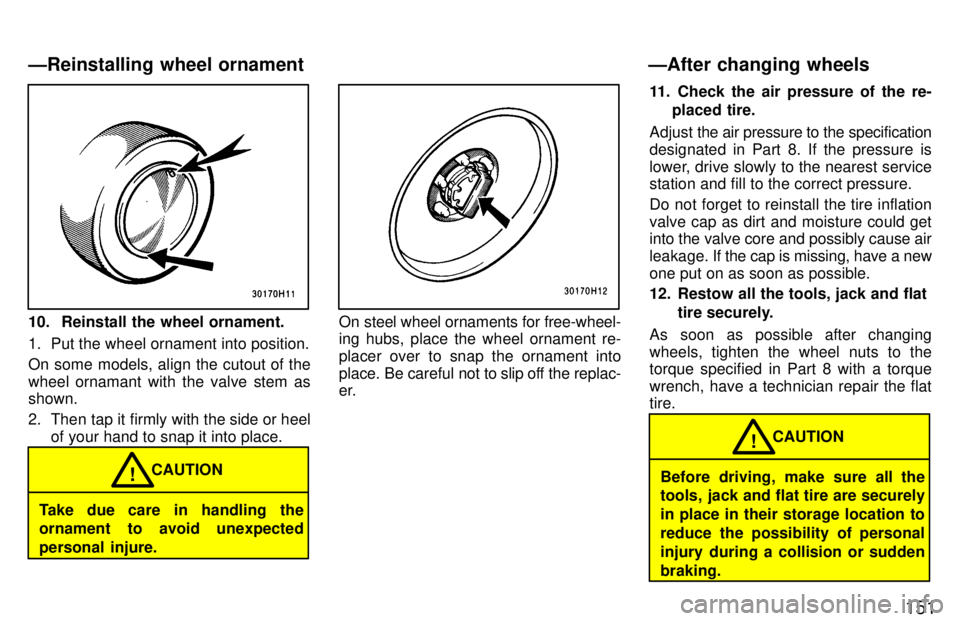
151
10. Reinstall the wheel ornament.
1. Put the wheel ornament into position.
On some models, align the cutout of the
wheel ornamant with the valve stem as shown.
2. Then tap it firmly with the side or heelof your hand to snap it into place.
Take due care in handling the
ornament to avoid unexpected
personal injure. CAUTION
!
On steel wheel ornaments for free-wheel-
ing hubs, place the wheel ornament re-
placer over to snap the ornament into
place. Be careful not to
slip off the replac-
er. 11. Check the air pressure of the re-
placed tire.
Adjust the air pressure to the specification
designated in Part 8. If the pressure is
lower, drive slowly to the nearest service station and fill to the correct pressure.
Do not forget to reinstall the tire inflation valve cap as dirt and moisture could get into the valve core and possibly cause air
leakage. If the cap is missing, have a new
one put on as soon as possible.
12. Restow all the tools, jack and flat
tire securely.
As soon as possible after changing
wheels, tighten the wheel nuts to the torque specified in Part 8 with a torque wrench, have a technician repair the flat tire.
Before driving, make sure all the
tools, jack and flat tire are securely in place in their storage location to
reduce the possibility of personal
injury during a collision or suddenbraking. CAUTION
!
ÐReinstalling wheel ornament
ÐAfter changing wheels